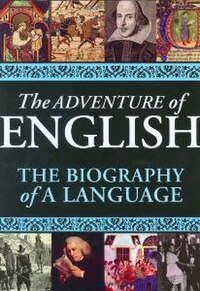The Adventure of English
| The Adventure of English | |
|---|---|
 | |
| Created by | Melvyn Bragg |
| Starring | Melvyn Bragg |
| No. of episodes | 8 |
| Production | |
| Running time | 45-52 min per episode |
| Original release | |
| Network | ITV |
| Release | 6 November – 30 November, 2003 |
The Adventure of English is a British television series (ITV) on the history of the English language presented by Melvyn Bragg as well as a companion book, also written by Bragg. The series ran in 2003.
The series and the book are cast as an adventure story, or the biography of English as if it were a living being, covering the history of the language from its modest beginnings around 500 AD as a minor guttural Germanic dialect to its rise as a truly established global language.
In the television series, Bragg explains the origins and spelling of many words based on the times in which they were introduced into the growing language that would eventually become modern English.
Episode list
| # | Episode | Original Airdate | |
|---|---|---|---|
| 1 | "Birth of a Language" | November 6, 2003 | |
|
The modern Frisian language is the closest sounding language to the English used approximately 2000 years ago, when the people from what is now the north of the Netherlands travelled to what would be the United Kingdom and pushed the Celts to the western side of the island. Words like "blue" can be recognized in the Frisian language. Bragg then discusses how English dialects in certain areas of the United Kingdom were heavily influenced by historical events such as the invasion of the Vikings in the east, contributing words such as "sky" to the English language. | |||
| 2 | ""English Goes Underground"" | November 6, 2003 | |
|
Bragg discusses how class also affected the use of English, especially in the time of William the Conquerer and for approximately 300 years after his reign; during this period, only the French language and Latin were used in state affairs and by the aristocracy, while English remained in use with the lower peasant classes. | |||
| 3 | ""The Battle for the Language of the Bible"" | November 13, 2003 | |
|
In the early to mid 1300s, English fought to be the language of the Christian Bible through the efforts of theologian John Wycliffe, who opposed the church's use of a Latin scripture because it prevented most of the population from reading the bible for themselves. Though Wycliffe died before English became the official language of the bible, Bragg discusses how his translation eventually lead to the transition of various Latin words into the English language, including "emperor," "justice,""profession," "suddenly" or "angel." Eventually, Henry V of England would use his power in order to create this English language bible in the early 1400s. However, the difficulty of creating a common language for all the English dialects in the United Kingdom had to be addressed since there was such an array of spellings and pronunciations. Bragg explains, "The '-ing' participle, as in 'running,' was said as '-and' in the North, '-end' in the East Midlands, and '-ind' in the West Midlands. So 'running could also be said as 'runnand,' 'runnind,' and 'runnend.'" The number of spellings was even greater, Bragg offers sixteen different ways in which the word meaning "church" had been spelt at the time, including "kerke," "kirc," "chirche," "cherge" and "schyrche." The Chancery had the duty of creating an official spelling for each spoken word, much of which is still used in modern English. Still, the spelling was confusing because of the debates that went on during this period, for example many words wound up being spelt as to their roots like the words "debt" and "doubt" which came from the French language. The word "rhyme" was given an "h" simply because the word "rhythm" already had one. Around this time the Great Vowel Shift also took place, which altered spoken English from the Old English pronunciation to a more modern sounding form. The possession of an English bible had become illegal once more and William Tyndale left the country to write his translation of the bible from the original Hebrew and Greek version, which he published in 1526. Many of his sayings are still used today, including, "scapegoat," "the apple of mine eye," "eat, drink and be merry," and words such as "beautiful" and "zealous." Eventually, Henry VIII of England wished for the creation of an English bible and a new Church of England so that he could divorce his wife Catherine of Aragon. In time, King James I would create an official version of the bible which had become wide spread with various versions. This bible deliberately used words like "ye" and "thou," which were no longer in common use, to create the sense that the words written would appear to be ancient, to have authority. | |||
| 4 | ""This Earth, This Realm, This England"" | November 13, 2003 | |
| 5 | ""English in America"" | November, 2003 | |
| 6 | ""Speaking Proper"" | November, 2003 | |
| 7 | ""The Language of Empire"" | November, 2003 | |
| 8 | ""Many Tongues Called English, One World Language"" | November, 2003 | |
DVD
A DVD set of the mini-series was released on June 2, 2009 with an overall runtime of 405 minutes.
